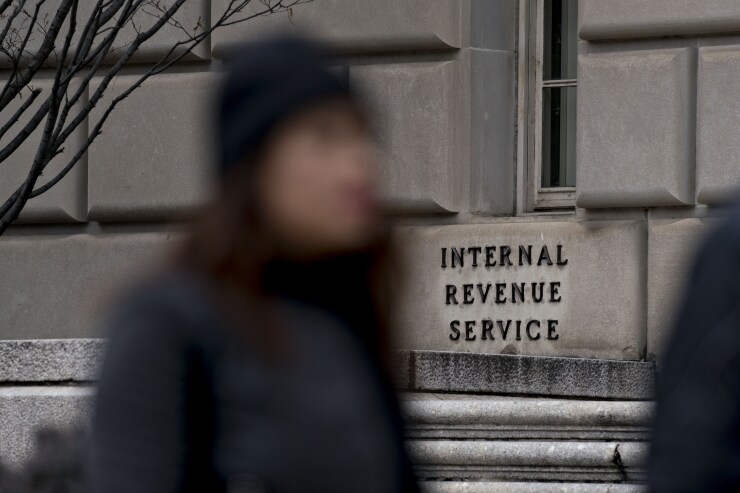Enjoy complimentary access to top ideas and insights — selected by our editors.
Layoffs and other executive moves at the Internal Revenue Service are the latest in a series of ripples the Trump administration has made in the tax arena, from proposed tariffs to extending the landmark Tax Cuts and Jobs Act of 2017.
Accountants and tax pros are left asking how new reporting standards, congressional budget efforts and a thinned-out IRS will impact the ongoing tax season.
Thousands of employees across the IRS’s divisions responsible for small business and self-employed filers, enforcement and collection duties and handling processing responsibilities were
Most recently, the IRS is allegedly exploring further cuts that would lay off
These firings have former IRS commissioners concerned that the agency’s progress towards improving filing turnarounds will now be upended,
“A lot of these people have been there a year to two years, and are revenue agents and revenue officers, but also customer service,” John Koskinen, who was IRS commissioner from 2013-2017, told Accounting Today. “They can do more standard work, so the more senior people can handle a more complicated issue. … So when you wipe them out, the more senior people then have to fill the gaps to the extent they can.”
Read more:
Bipartisan legislators have been working to advance proposals that, if passed, would improve the digital filing process for taxpayers and provide more flexibility in the IRS’s “math error” calculations. The House Ways and Means Committee passed both bills in February.
Mark Giallonardo, tax partner-in-charge for Top 25 Firm Cherry Bekaert’s south Florida region, said that for now, accountants need to first manage filing expectations to help clients weather these delays, while prioritizing electronic filings and payments to minimize the slowdown in processing and problem resolution.
Fraud has also become a growing concern among accountants, as the IRS’s diminished enforcement capabilities fuel concerns of bad actors falling through the cracks.
Data released by the agency’s
Noteworthy cases from the
All of that could change in the wake of widespread staff cuts, however.
Kevin Knull, chief executive of the Frisco, Texas-based tax record fintech TaxStatus, said that delays are only the tip of the iceberg.
“In the aftermath of massive data breaches in 2024, criminals are already using stolen taxpayer identification numbers to file fake and fraudulent returns, trying to claim the refunds before the legitimate taxpayer files or is aware of the issue,” Knull said. “When these fraudulent claims are uncovered, the legitimate taxpayer is forced to deal with the consequences, including working with the IRS to recover their rightful benefits or refunds.”
Read more:
Layoffs and proposed regulations are only two pieces of the puzzle, the latest being a draft agreement between the IRS and
Under the proposed arrangement, a joint task force of DOGE representatives and IRS software engineers would oversee debugging, software testing, programming and implementing safeguards to prevent fraud, according to the memo obtained by Bloomberg Tax. At the time of reporting, the memo did not limit what kinds of taxpayer information DOGE officials could access.
Legal experts with The W Tax Group, a tax defense company located in Southfield, Michigan, explained how DOGE’s involvement weighs the importance of protecting personal privacy against the significance of improving how the IRS operates.
“The reality is that the IRS already shares sensitive taxpayer information with contractors, congressional committees and Treasury personnel, [therefore] proper restrictions on DOGE, with limited and monitored access, will help root out mismanaged money and fraud without putting taxpayer privacy in danger,” Stephen Weisberg, principal attorney and founder, said. “If the process is handled appropriately, the risks are not as extreme as some suggest.”
Once a new IRS acting commissioner is confirmed, the agency’s path forward will start to come into focus and provide accountants with more clarity on what to expect from the service moving forward.

Former IRS heads predict delays ahead for agency
Following numerous layoffs at the IRS, former agency leaders say processing delays are on the horizon.
More than 7,000 IRS staffers, most of whom were probationary employees, were dismissed last month as part of government-wide cuts. With the enforcement and collection areas sustaining the largest downsizes, past IRS commissioners said the decisions seemingly go against the mission to increase cost savings.
“The irony is this is an administration that claims to be worried about the deficit and claims to be looking for $2 trillion in savings. … And it seems to be nonsensical to think that one good way to do that is to hamstring your revenue arm, your accounts receivable division,” John Koskinen, who was IRS commissioner from 2013-2017, told Accounting Today.
Read more:

Stefani Reynolds/Bloomberg
More than 7,000 IRS employees expected to be laid off
Tax season is well under way, and so are widespread staff cuts across the IRS.
Various news outlets reported significant numbers of employees at the agency being let go, ranging from more than 3,500 probationary staffers in the
“Indiscriminate firings of IRS employees around the country are a recipe for economic disaster,” Doreen Greenwald, National Treasury Employees Union national president, said in a statement. “In the middle of a tax filing season, when taxpayers expect prompt customer service and smooth processing of their tax returns, the administration has chosen to decimate the whole operation by sending dedicated civil servants to the unemployment lines.”
Read more:

Andrew Harnik/Getty Images North America
The Trump Administration is turning the tax world on its head
Death and taxes, as the old adage goes, are the only two things certain in life. But while taxes aren’t going away, the same can’t be said for the underlying regulations.
Starting with President Trump’s Jan. 20 executive order enacting a
In speaking with AT’s
“Consistent with the move against DEI, my guess would be a return to enforcement without scrutiny of results by racial grouping,” Everson said.
Read more:

Bipartisan bills seek to modernize tax filing and admin at IRS
The Electronic Filing and Payment Fairness Act and IRS Math and Taxpayer Help Act are moving on with bipartisan support, both aiming to introduce more transparency and ease of access to taxpayers’ lives.
The first would introduce changes into the filing procedures by allowing electronically submitted documents to be afforded the same timeliness standards as paper counterparts, known as the “mailbox rule.” The second would mandate that the IRS provide taxpayers with justifications behind “math error” calculations and a 60-day comment period to refute the findings.
“The AICPA is pleased that these bills have been included in the markup and is encouraged by the momentum generated by these provisions moving forward in a bipartisan way,” Melanie Lauridsen, vice president of tax policy and advocacy for the AICPA, said in a statement.
Read more:

IRS hiring freeze, pulled job offers is cold start for 2025 tax season
It’s a cold start of tax season for the IRS, as a lengthy hiring freeze casts a great shadow over the agency.
President Trump’s executive order, simply named “
In speaking with AT’s
“A third of the workforce is eligible for retirement, and if you hire new people, they don’t come in as senior auditors, they come in out of college or relatively inexperienced for the most part,” Smith said. “It takes two years to train them and get them marginally effective. … If you kill all that, there will be a tremendous amount of natural attrition at the service, and the attrition is going to be at the most experienced level, which will have a huge impact.”
Read more:
Credit: Source link










